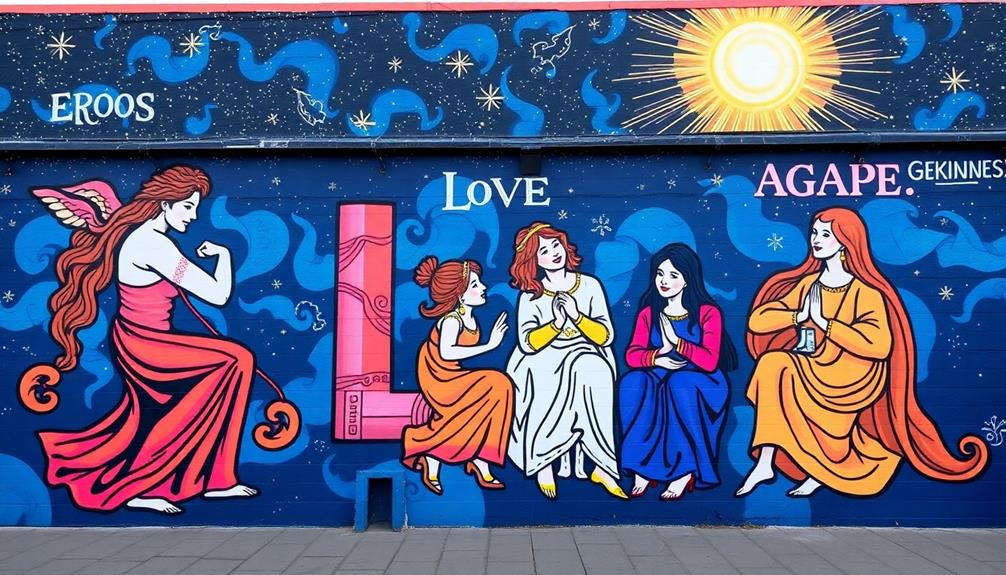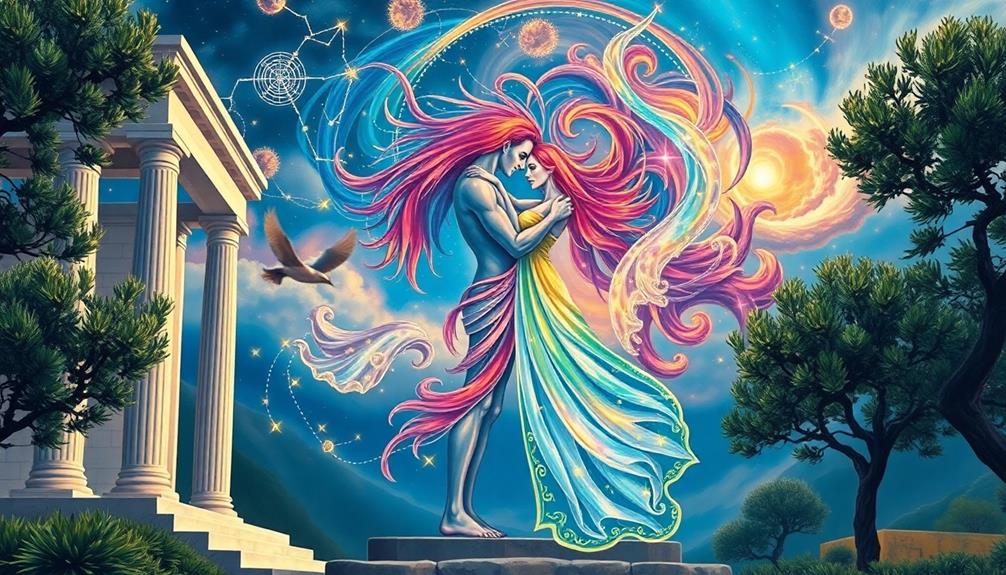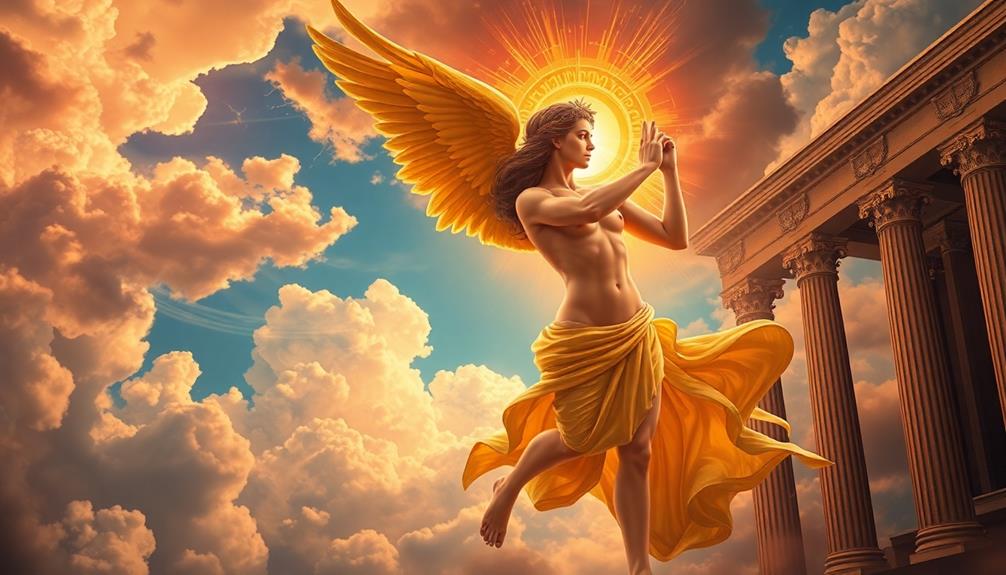Ancient Greeks had a complex view of love, intertwining divine influence with human connection. They recognized several types of love, including Eros for passion, Philia for friendship, and Agape for selfless compassion. Aphrodite, the goddess of love, played an essential role in shaping romantic desires and relationships. They also explored the idea of soulmates, suggesting that true fulfillment comes from personal growth rather than dependency on others. Love stories in their mythology reveal both the beauty and chaos of relationships, emphasizing the transformative power of love. There's much more to discover about these fascinating beliefs and their enduring impact on us today.
Key Takeaways
- Ancient Greeks recognized various types of love, including Eros, Philia, Agape, Storge, and Mania, each reflecting different emotional connections.
- Aphrodite, the goddess of love, played a crucial role in influencing romantic relationships and was worshipped through rituals and offerings.
- The concept of soulmates in Greek mythology suggests that true love encourages personal growth and self-discovery rather than dependency on others.
- Myths illustrate important lessons about balancing desire and reason, the dangers of unchecked passion, and the value of trust and loyalty in relationships.
- Greek philosophical critiques promote the idea that love should lead to personal development and understanding rather than reliance on another for completeness.
Ancient Greek Beliefs About Love

When you immerse yourself in ancient Greek beliefs about love, you'll discover a rich tapestry of concepts that categorize this profound emotion into distinct types. The ancient Greeks identified several forms of love, each reflecting a unique aspect of human connection.
Eros represents romantic love, igniting passion and desire, while Philia embodies affectionate friendship, highlighting loyalty and camaraderie. Agape stands for selfless love, a deep compassion for others, and Storge captures the warmth found in familial bonds. On the other hand, Mania reflects obsessive love, often leading to turmoil.
The concept of soulmates also emerged from these beliefs, rooted in the myth that humans were once whole beings, split by Zeus. This idea, discussed in Plato's Symposium through Aristophanes' speech, suggests that your quest for your other half is a fundamental part of existence.
However, Greek philosophers like Plato critiqued the soulmate notion, urging individuals to cultivate a self-sufficient understanding of love. Each type of love influenced personal growth and relationships, shaping how the ancient Greeks approached both romantic and platonic connections in their society.
Embracing these categories can enrich your perspective on love today.
The Role of Aphrodite

Aphrodite's influence on love is undeniable, shaping both mortal and divine relationships through her beauty and allure.
You'll see how worship practices like the Aphrodite Festival not only honored her but also sought her blessings for love and beauty in daily life.
Understanding her role gives you insight into the powerful connection between attraction and devotion in ancient Greek culture.
Aphrodite's Influence on Love
The allure of love often weaves through the tales of Greek mythology, where the goddess of love and beauty, Aphrodite, reigns supreme. She's not just a figure of beauty; Aphrodite embodies the power to incite romantic desire and passion among both mortals and gods. Her influence stretches beyond mere attraction; it's integral to the essence of relationships.
Aphrodite's presence is felt in various forms of love, especially Eros, the embodiment of romantic love. You'll find her depicted alongside symbols like doves, roses, and myrtle, reinforcing her importance in the cultural understanding of love.
She plays a pivotal role in numerous myths, including the infamous events of the Trojan War, showcasing how love can lead to both joyous unions and devastating consequences.
The ancient Greeks celebrated Aphrodite through festivals like the Aphrodisia, where worshippers honored her with offerings and rituals, acknowledging her significance in their lives.
Ultimately, Aphrodite's influence reminds you that love is complex, intertwining beauty and desire with both happiness and heartache. In every tale, her presence serves as a potent reminder of love's unpredictable nature.
Worship Practices for Aphrodite
Worship practices dedicated to Aphrodite reveal the deep reverence ancient Greeks held for the goddess of love and beauty. Across various city-states, especially in Corinth and Cyprus, temples and shrines dedicated to Aphrodite flourished.
Festivals like the Aphrodisia celebrated her through rituals, offerings, and communal feasts, highlighting her influence on love and fertility.
As a worshipper, you'd often present gifts to Aphrodite, such as flowers, incense, and small sculptures, as tokens of devotion. These offerings aimed to gain her favor in romantic pursuits.
Some temples even practiced sacred prostitution, where engaging with priestesses was thought to invoke Aphrodite's blessings on your love life.
Aphrodite's presence permeated art and literature, with symbols like doves, roses, and mirrors representing her associations with desire, beauty, and attraction.
When you participated in these worship practices, you not only honored Aphrodite but also sought her guidance in matters of the heart. Through these rituals, you'd connect with the essence of love itself, making the pursuit of affection a divine experience intertwined with the goddess's grace.
Types of Greek Love

Exploring the rich tapestry of Greek love reveals distinct types that shape human relationships in profound ways. The Greek gods often embodied these forms of love, influencing how people experienced them.
Eros stands out as the passionate, romantic love driven by physical attraction and desire. It's the fiery connection that many seek, often considered the most intense form of love in Greek culture.
Then there's Philia, which represents deep friendship and affectionate bonds devoid of romantic feelings. This love emphasizes loyalty and mutual respect, forming the foundation of strong relationships.
Agape, on the other hand, is a selfless, unconditional love directed toward others, including strangers, showcasing compassion and a sense of duty.
Storge reflects familial love, highlighting the natural affection and loyalty between family members, especially between parents and children.
Finally, there's Mania, which describes an obsessive or unhealthy love. This type can lead to emotional highs and lows, often resulting in toxic relationships.
The Concept of Soulmates

When you think about soulmates, it's easy to get caught up in the romanticized notion of finding that one perfect match.
Plato's philosophy offers a deeper perspective, suggesting that love can lead to personal growth and completeness, rather than dependency on another person.
Let's explore the different types of soulmates and the importance of fostering connections that enhance your life rather than define it.
Plato's Love Philosophy
Plato's exploration of love in the "Symposium" reveals a fascinating perspective on the concept of soulmates. Through the dialogue, Aristophanes presents an intriguing idea: humans were once whole beings, split in half by Zeus, leading to a lifelong search for their "other halves."
While this soulmate myth suggests that you need another person to feel complete, Plato critiques this notion as a simplistic understanding of love. He argues that true love isn't about dependence but about healing the fragmentation of your own nature.
Instead of seeking fulfillment solely through a soulmate, Plato emphasizes that love should inspire you to pursue beauty and truth, guiding you toward a deeper understanding of the divine. He believes that personal development and philosophical inquiry lead to wholeness, rather than relying on another for your completeness.
This perspective challenges the romanticized view of love, advocating for a connection to the self and a commitment to intellectual growth. Ultimately, in Plato's philosophy, the quest for soulmates serves as a backdrop for a more profound journey toward self-discovery and enlightenment.
Types of Soulmates
The idea of soulmates is rich and multifaceted, extending beyond the simplistic notion of finding a perfect romantic partner. Ancient Greek mythology introduces the concept that humans were once whole beings, split in half by Zeus, leading to a lifelong quest for your other half. This search emphasizes personal growth and self-discovery, suggesting that completeness can come from within.
Soulmates can be categorized in several ways, each reflecting different dimensions of love:
- Romantic Soulmates (Eros): These connections ignite passion and intimacy, embodying the romantic love that many yearn for.
- Friendship Soulmates (Philia): These bonds are rooted in shared experiences and deep emotional support, showcasing the beauty of platonic love.
- Twin Flames (Pragma): Representing profound, enduring connections, twin flames challenge you to grow and evolve, often mirroring your own strengths and weaknesses.
Many believe in the possibility of having multiple soulmates throughout life, each contributing to your journey.
Ultimately, the concept of soulmates invites you to explore the rich tapestry of love and connection that shapes your existence.
Critique of Dependency
Challenging the soulmate ideology reveals a concerning trend: many people believe they're incomplete without another person. This belief cultivates dependency, making you feel like personal fulfillment hinges on finding your "other half." Instead of fostering your own growth, you might seek an ideal partner to complete you, setting yourself up for disappointment.
| Dependency on Soulmates | Importance of Self-Love |
|---|---|
| Promotes unrealistic expectations | Encourages personal growth |
| Overlooks individual strengths | Develops self-identity |
| Diminishes overall happiness | Fosters independence |
Critics argue that this soulmate perspective undermines self-love and personal development. If you tie your happiness solely to romantic relationships, you risk overlooking your own completeness. Embracing the notion that you're whole as you are opens doors to authentic connections without unrealistic demands.
Ultimately, the critique of dependency in the soulmate narrative emphasizes that happiness should come from within. Cultivating your identity and finding joy independently allows you to approach relationships from a place of strength, rather than neediness. Remember, you're not incomplete; you're a complete person ready to share your life with another.
Philosophical Insights on Love

Love's intricate nature has long captivated philosophers, especially in ancient Greece, where thinkers like Plato and Aristotle explored deep into its meaning and implications. They provided profound philosophical insights on love that still resonate today.
For instance, Plato, in his "Symposium," distinguished between Eros, or romantic love, and Agape, which represents selfless love, emphasizing love's role in seeking truth and beauty.
In this philosophical landscape, you'll find three key ideas:
- The Myth of Soulmates: Aristophanes suggested that humans were once whole but split in half by Zeus, igniting a quest for their missing halves.
- Healing Through Love: Plato criticized the soulmate notion, arguing that true love should help heal our fragmented nature instead of relying on another for completeness.
- Ethics of Love: Socrates and Aristotle examined love's ethical implications, with Socrates promoting rational understanding as a pursuit of wisdom, while Aristotle viewed love as essential for friendship and moral growth.
These insights reveal how love intertwines with human nature, virtue, and the pursuit of a fulfilling life, showcasing its complexity beyond mere emotion.
Love Stories in Greek Mythology

From the tales spun in ancient Greece, you'll discover that love isn't just a simple emotion; it's a powerful force that shapes destinies and intertwines the lives of gods and mortals alike.
These love stories reveal the complexities of passion, desire, and heartache. Eros, the mischievous god of love, often stirs chaos, igniting romantic attraction while entangling relationships.
Take the tragic love story of Orpheus and Eurydice, where love transcends death itself. Orpheus's descent into the Underworld to reclaim his beloved highlights the limits of human understanding when faced with divine will.
In contrast, Pygmalion's infatuation with his created statue, brought to life by Aphrodite, showcases how love can transform reality.
Then there's Apollo and Daphne, a poignant reminder of unrequited love. Apollo's relentless pursuit leads Daphne to become a laurel tree, forever symbolizing desire that goes unfulfilled.
Finally, the passionate affairs of Zeus with mortal women often yield demigods, illustrating how love influences human destinies and heroism.
Through these love stories, you see that love, in all its forms, profoundly affects lives, weaving an intricate tapestry of fate in Greek mythology.
Critique of Soulmate Ideology

The concept of soulmates often creates a misleading narrative about love and personal fulfillment. This ideology suggests that you're incomplete without another person, fostering a dependency that can distort your view of happiness. By promoting the idea that there's a perfect partner out there, it sets you up for unrealistic expectations in relationships.
Here are three critiques of the soulmate ideology:
- Dependency for Fulfillment: Believing you need a soulmate can undermine your ability to grow independently, making you reliant on someone else for happiness.
- Unrealistic Expectations: This notion can lead you to chase an idealized version of love, causing dissatisfaction when real relationships inevitably fall short of perfection.
- Overlooking Self-Acceptance: By viewing love as a means to completeness, you may neglect the importance of personal growth and self-acceptance, leading to a lack of appreciation for your own qualities.
Ultimately, the soulmate ideology can diminish your sense of self-worth, encouraging you to seek validation solely through romantic connections rather than celebrating your individuality and achievements.
Cultural Representations of Love

Throughout history, cultures have depicted love in diverse and often complex ways, shaping our understanding of this profound emotion. In ancient Greece, love wasn't just a simple feeling; it was a multifaceted experience. You'd encounter different forms such as Eros, the passionate romantic love, Philia, the deep bond of friendship, and Agape, the selfless love that transcends personal desires. These concepts influenced the dynamics among characters in literature and mythology.
Divine intervention played a significant role, with gods and goddesses like Aphrodite and Eros influencing human relationships. Their stories often highlighted love's dual nature, illustrating both joy and suffering. Greek plays, whether tragedies or comedies, explored themes of desire, betrayal, and sacrifice, showcasing love's complexities.
In art, Greek pottery and sculptures emphasized physical beauty and romantic encounters, reflecting cultural ideals of attraction. Philosophers like Plato took a different approach in works like "Symposium," critiquing conventional notions of love. They argued that true love transcends mere physical attraction, leading to the pursuit of higher knowledge and virtue.
This rich tapestry of cultural representations shaped how love was understood and celebrated in ancient Greek society.
Legacy of Greek Love Myths

Cultural representations of love in ancient Greece laid the groundwork for enduring myths that still resonate today. Greek love myths provide a rich tapestry of emotional connections, illustrating the complexity of human relationships. Concepts like Eros, Philia, and Agape highlight various forms of love, while the story of soulmates—humans split in half by Zeus—captures the essence of longing for connection and completeness.
The legacy of these myths shapes how you view love and relationships in modern times. Consider these three enduring influences:
- Emotional Bonds: The emphasis on deep connections reminds you to prioritize meaningful relationships over superficial ones.
- Ideal Partnerships: Myths encourage the pursuit of soulmates, fueling the belief that there's someone out there meant for you.
- Duality of Love: Greek stories illustrate love's powerful nature, showing that it can inspire noble actions or lead to destructive outcomes.
As you navigate love in your life, remember that the ancient Greeks recognized its complexities. Their myths remind you that love is a journey toward beauty, truth, and profound connection with others.
Frequently Asked Questions
What Did the Ancient Greeks Believe About Love?
The Ancient Greeks believed love manifests in various forms, like romantic passion and deep friendship. They thought love could heal souls, restore balance, and often depicted it in their art, reflecting its profound emotional significance.
Did the Greeks Actually Believe in the Myths?
They say, "Seeing is believing," but the Greeks often viewed myths as cultural stories rather than strict truths. You'd find they engaged with these narratives to explore complex emotions like love, not just to worship.
What Does Greek Mythology Say About Love?
Greek mythology portrays love as multifaceted, encompassing passionate Eros, selfless Agape, and transformative stories like Pygmalion and Orpheus. You'll find love depicted as a powerful force shaping destinies and transcending even death.
What Is the Origin of Love Greek Myth?
You might think love's just a modern concept, but Greek myth shows it originated as humans were split in two, endlessly searching for their missing halves, revealing love's deep connection to our very existence.
Conclusion
In exploring the myths of love, you uncover the rich tapestry of ancient Greek beliefs that shaped our understanding of romance. From Aphrodite's influence to the philosophical musings on soulmates, these stories remind us that love isn't just a feeling—it's a complex journey. As the saying goes, "Love is blind," but the Greeks showed us that it's also enlightening. Their legacy continues to inspire us, urging you to embrace love's multifaceted nature in your own life.









